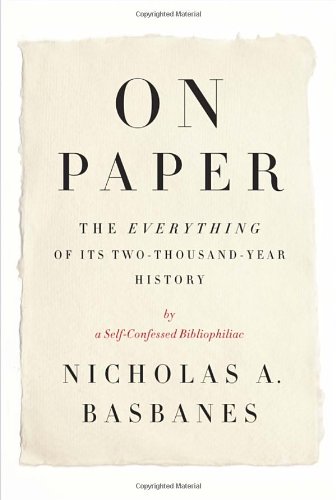

Most ebook files are in PDF format, so you can easily read them using various software such as Foxit Reader or directly on the Google Chrome browser.
Some ebook files are released by publishers in other formats such as .awz, .mobi, .epub, .fb2, etc. You may need to install specific software to read these formats on mobile/PC, such as Calibre.
Please read the tutorial at this link: https://ebookbell.com/faq
We offer FREE conversion to the popular formats you request; however, this may take some time. Therefore, right after payment, please email us, and we will try to provide the service as quickly as possible.
For some exceptional file formats or broken links (if any), please refrain from opening any disputes. Instead, email us first, and we will try to assist within a maximum of 6 hours.
EbookBell Team

0.0
0 reviewsA consideration of all things paper—its invention that revolutionized human civilization; its thousand-fold uses (and misuses), proliferation, and sweeping influence on society; its makers, shapers, collectors, and pulpers—written by the admired cultural historian and author of the trilogy on all things book-related: A Gentle Madness;Patience and Fortitude (“How could any intelligent, literate person not just love this book?”—Simon Winchester); and A Splendor of Letters (“Elegant, wry, and humane”—André Bernard, New York Observer).
Nicholas Basbanes writes about paper, from its invention in China two thousand years ago to its ideal means, recording the thoughts of Islamic scholars and mathematicians that made the Middle East a center of intellectual energy; from Europe, by way of Spain in the twelfth century and Italy in the thirteenth at the time of the Renaissance, to North America and the rest of the inhabited world.
Basbanes writes about the ways in which paper has been used to record history, make laws, conduct business, and establish identities . . . He makes clear that without paper, modern hygienic practice would be unimaginable; that as currency, people will do almost anything to possess it . . . that the Industrial Revolution would never have happened without paper on which to draw designs and blueprints.
We see paper’s crucial role in the unfolding of historical events, political scandals, and sensational trials: how the American Revolution which took shape with the Battle of Lexington and Concord, began with the Stamp Act of 1765 . . . the Dreyfus Affair and the forged memorandum known as “the bordereau” . . . America’s entry into World War I with the Zimmerman Telegram . . . the Alger Hiss spy case and Whittaker Chambers’s testimony involving the notorious Pumpkin Papers . . . Daniel Ellsberg's release of the Pentagon Papers in 1971 and the scandal of Watergate.
Basbanes writes of his travels to get to the source of the story—to China, along the Burma Road, and to Japan, whose handmade paper, washi, is as much an expression of the human spirit as it is of craftsmanship . . . to Landover, Maryland, home of the National Security Agency and its one hundred million ultra secret documents, pulped by cryptologists and sent to be recycled as pizza boxes and egg cartons . . . to the Crane Paper mill of Dalton, Massachusetts, a seventh-generation family-owned enterprise, the exclusive supplier of paper for American currency since 1879 . . . and to the Kimberly-Clark mill in New Milford, Connecticut, manufacturer daily of one million boxes of Kleenex tissue and as many rolls of Scott kitchen towels.
Entertaining, illuminating, irresistible, a book that masterfully guides us through paper’s inseparability from human culture . . .